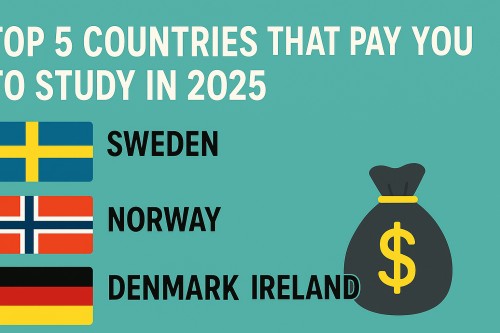Is the thought of student debt keeping you up at night? Imagine a world where you get a world-class education, experience a new culture, and you don’t have to pay a single cent for it—in fact, some opportunities might even provide a stipend for your living costs. It sounds like a dream, but it’s a reality. For ambitious students, finding countries that pay you to study in 2025 is a key strategy for a debt-free future. This guide will show you how to do it.
Background & Importance
The cost of higher education is a significant barrier for many aspiring students worldwide. With the average international education costing tens of thousands of dollars a year, the search for affordable and, ideally, free opportunities has intensified. Fortunately, many countries recognize that education is an investment in human capital. By offering free tuition or comprehensive scholarships, they are attracting top global talent to contribute to their economy and research. This shift makes it more possible than ever to pursue a degree without a mountain of debt.
Main Strategies / Core Concepts
To truly get “paid to study,” you need to look beyond simple tuition waivers. The most lucrative opportunities combine no tuition with a scholarship that covers your living expenses. Here are the top countries with paid study opportunities.
1. Germany: Tuition-Free Public Universities
Germany remains a global leader in accessible education. Most public universities are tuition-free for all students, including international ones. You’ll only need to pay a small semester fee, which is typically a few hundred euros and often includes a public transport pass.
While this covers tuition, you will still need to budget for living costs. The good news? Germany’s government and academic organizations offer a wide range of scholarships. The most well-known is the German Academic Exchange Service (DAAD), which provides monthly stipends of €934 for graduates, along with coverage for health insurance. This makes it one of the most reliable countries that pay you to study in 2025 through a combination of no tuition and a generous stipend.
2. Sweden: Paid PhD Positions
For aspiring academics, Sweden offers a unique and highly attractive model. While bachelor’s and master’s degrees typically have tuition fees for non-EU/EEA students, a PhD position is considered a full-time, paid job. This means you receive a monthly salary, not a grant.
This model is a game-changer for doctoral candidates, providing not just free education but a competitive salary, social security benefits, and paid vacation. For master’s students, the Swedish Institute Scholarships for Global Professionals (SISGP) offer full funding, covering both tuition fees and a living stipend.
3. Norway: High-Quality, Free Education
Norway’s public universities continue to maintain a tuition-free policy for all students, regardless of nationality. This applies to all levels, from undergraduate to PhD. This makes it an ideal destination for those seeking a high-quality education without the initial cost.
However, living expenses in Norway are among the highest in Europe. While this may seem daunting, a number of scholarships, such as the Quota Scheme, offer monthly stipends to help international students from developing countries manage their costs.
4. The UK: Home to Prestigious Fully-Funded Scholarships
Although the UK is known for high tuition fees, it is also home to some of the world’s most prestigious and comprehensive scholarships. These awards are a true form of being “paid to study.”
- Chevening Scholarships: This is a UK government-funded program for aspiring leaders. It covers university tuition fees, a monthly living stipend, round-trip airfare to the UK, and visa costs. For the 2025-2026 academic year, applications are open, with a strict deadline for submission.
- Commonwealth Scholarships: Similar to Chevening, these scholarships are highly competitive and provide full financial support for students from Commonwealth countries.
5. Other Paid Opportunities: France & Switzerland
Beyond the top contenders, countries like France and Switzerland offer highly sought-after, fully-funded programs for top-tier candidates. The Eiffel Excellence Scholarship Program in France provides a monthly allowance for master’s and PhD students, along with international travel and other benefits. Similarly, the Swiss Government Excellence Scholarships offer a monthly stipend, tuition fees, and health insurance for postgraduate and research students.
Data-Driven Insights or Case Studies
- DAAD Stipend Update (2025): The DAAD has announced that the monthly stipend for doctoral candidates will increase to €1,400 starting in February 2026, reinforcing Germany’s commitment to supporting international researchers.
- Chevening Work Experience Requirement: For the 2025-2026 academic year, Chevening confirmed that applicants must have at least two years (2,800 hours) of work experience, which can include both paid and unpaid work, showing their commitment to finding diverse candidates.
Common Mistakes to Avoid
- Assuming “Tuition-Free” Means “Free to Live”: This is the biggest misconception. Countries like Germany and Norway may have free tuition, but you are still responsible for proving you have sufficient funds for living expenses to get a visa. For Germany, this is a blocked account with a minimum of €11,904 as of 2025.
- Missing Key Deadlines: Fully-funded scholarships like Chevening and DAAD often have application deadlines up to a year in advance of the start date. Failing to plan ahead is a common reason for missed opportunities.
Expert Tips / Advanced Techniques
- Start Your Research Early: Begin looking for programs at least 12-18 months before your intended start date. This gives you ample time to gather documents, improve language skills, and craft a strong application.
- Tailor Your Application: Don’t use a generic letter of motivation. Clearly articulate why you are applying to a specific country or university and how your goals align with the program’s vision.
- Think Beyond the Bachelor’s: While undergraduate opportunities exist, the most generous funding is often available at the postgraduate and doctoral levels. If possible, complete your bachelor’s in your home country and then apply for a master’s or PhD abroad.
Conclusion
The dream of a debt-free education is within your reach. With careful planning and thorough research, you can find countries that pay you to study in 2025. Whether you’re drawn to Germany’s academic excellence, Sweden’s paid PhD model, or the comprehensive scholarships of the UK, the key is to be proactive and strategic. By avoiding common mistakes and following expert tips, you can transform your study abroad ambitions into a financially smart reality.
Ready to start your journey? Share your questions or experiences in the comments below! And be sure to check out our related articles on “How to Write a Powerful Motivation Letter” and “The Ultimate Guide to Getting a Student Visa.”
FAQs
Q: Do these countries really pay for my living expenses?
A: Yes, but this usually comes from highly competitive, fully-funded scholarships like Chevening or the Swedish Institute. Tuition-free countries, on the other hand, cover academic costs, but you are still responsible for your living expenses.
Q: Can I get a full scholarship for a bachelor’s degree?
A: While possible, full scholarships for undergraduate degrees are very rare. The most significant funding is typically reserved for master’s and doctoral students, as countries prioritize attracting top talent for advanced research and specialized fields.
Q: Do I need to learn the local language to study for free?
A: Not always. Many universities in these countries, especially at the postgraduate level, offer a wide array of programs taught entirely in English. However, learning the local language will greatly improve your social life and career prospects.





